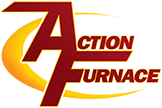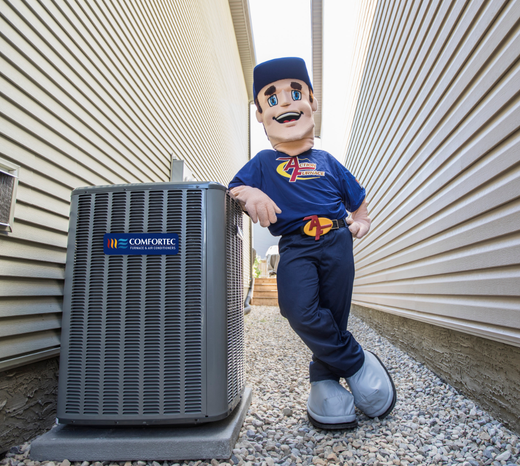It seems like every summer in Alberta, you awaken to hazy red skies and the smell of wildfire smoke. You may not be dealing with a fire itself, but n...
It seems like every summer in Alberta, you awaken to hazy red skies and the smell of wildfire smoke. You may not be dealing with a fire itself, but no shortage of damage comes from travelling smoke. Harmful ash particles affect our homes, vehicles, belongings, and pets. Oh, and our health—let’s not leave out the most important thing!
Fine particles from wildfire smoke are good at finding their way into your house and wreaking havoc on your indoor air quality (IAQ). This is terrible for your respiratory health, especially if you suffer from pre-existing heart or lung conditions.
Fortunately, there are a few ways to reduce the smell of wildfire smoke in your home. Making sure your HVAC systems are optimized for better quality breathing is one of them.
How Does Wildfire Smoke Affect the Air Quality in Alberta?
Here in Alberta, smokey skies have become an annual event. As wildfires burn in BC and the western United States, Pacific winds bring the resulting smoke right to our backyard. This has a huge impact on air quality and usually results in special air quality statements.
The smoke from wildfires leads to poor air quality in any affected area. The Air Quality Health Index provides detailed information about the air quality in your region.
What’s in Wildfire Smoke?
Wildfire smoke is made of gasses like carbon dioxide and carbon monoxide, water vapour, and ash mixed with massive amounts of particulate matter. The particles vary in size, although finer particles are more threatening to your health as they can easily enter the body through inhalation.. Wildfire smoke can also contain many other toxic components like methane and acetic acid, depending on the burned materials.

What Are the Health Effects?
Wildfire smoke is mainly made up of fine particulate matter, which can find its’ way deep into your lungs and even your bloodstream. It is a respiratory irritant, so you can expect similar symptoms to a cold and difficulty breathing, even in healthy individuals. People with pre-existing respiratory conditions can experience severe shortness of breath and wheezing.
While health effects will be worse the more time you spend outside, these pollutants can also get into your home during the smokey season. Special air quality statements will always come with recommendations, which should be followed. You can do some things to reduce these effects in your house at any time during the wildfire season.
How Can You Reduce the Effects of Smoke in Your Home?
Keeping your windows and doors closed is the first defence against wildfire smoke entering the house. It’s also wise to refrain from using window-mounted AC units or bathroom fans, unless you’re desperate for air circulation.
Though these initial steps are helpful, small particles in smoke can still find their way into your home’s air supply. Here are some other useful tips to keep the smokey smell out.
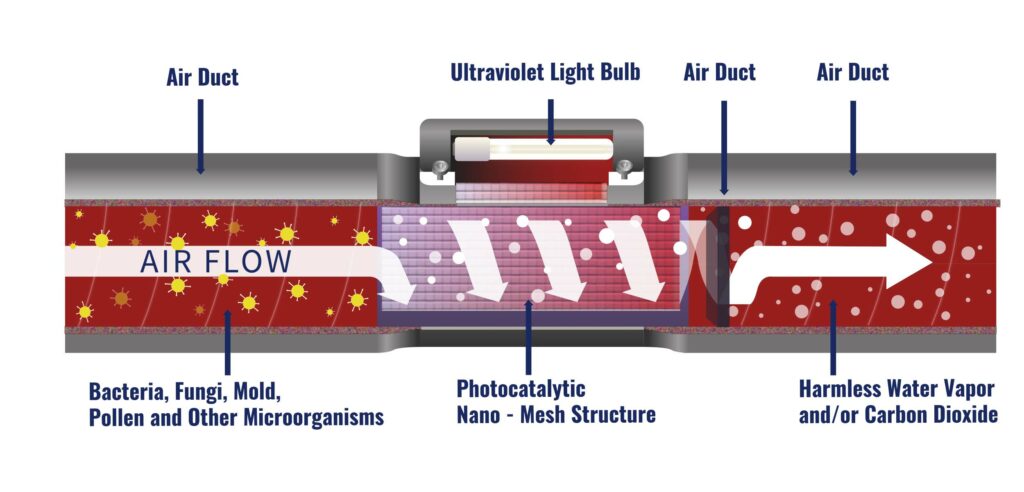
Use an Air Purifier
Air purifiers scrub the air in your home for pollutants, allergens, and toxic particles. Although they cannot always remove 100% of the toxins, they are one of the most effective tools for maintaining air quality in your home. As a purifier cleans the air, it will also help eliminate the smell of wildfire smoke.
Keep in mind that a small, single-room purifier will not be able to scrub an entire house. If you’re limited to a portable air purifier, it’s best to keep it in a room used most, like the bedroom where you sleep.
A whole-home air purifier integrates right into your existing HVAC system. These purifiers work in tandem with air filtration using UV light technology to provide clean air to your home. Even if it’s smokey outside.
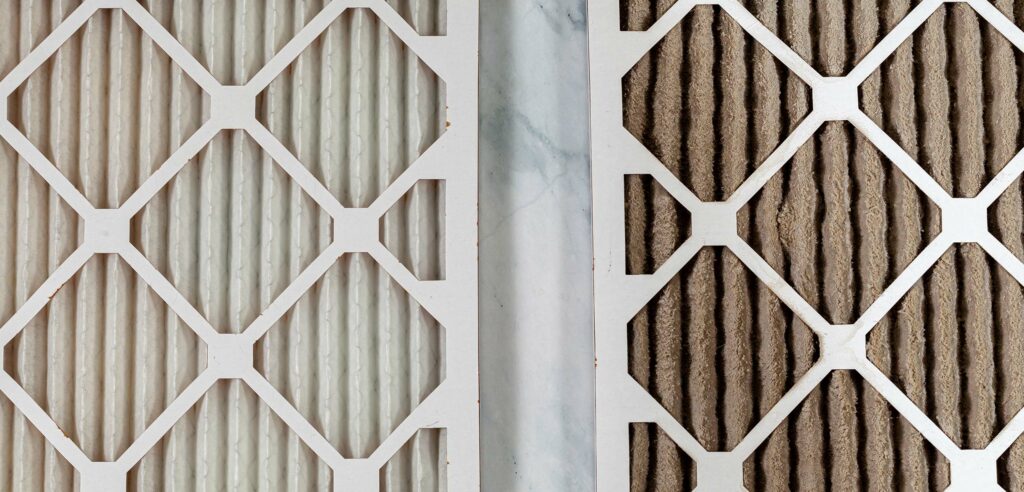
Keep Your HVAC Filters Fresh
In most circumstances, your HVAC air filters should last about 3 months. But when the air supply is dirtier or contaminated with more particles, like smokey air from wildfires, a filter may become clogged sooner than expected.
During wildfire season, check your furnace or air conditioner filter every month. Make sure your filter isn’t totally clogged, black, or filthy. If your home constantly smells like a campfire, you may want to upgrade to HEPA filters or another filter type with a high MERV rating.
Clean air filters trap particles and also remove odours. Read this article for more information on air filters and the health benefits of having clean filters for your home’s heating and cooling systems.

Your Air Conditioner Can Help
Yes! Keeping your air conditioner ON will recirculate air in your home, which helps filter harmful particulate matter out of the air. Ensure that your air conditioner has a filter, and replace it if you haven't done so recently.
Central air conditioners remove heat from your indoor air supply by recirculating it through the system. Your AC filter will catch particle matter and help maintain air quality. Air purification equipment can always be added to new or existing AC to further improve air quality.
Since wildfire season is typically in the heart of summer, keeping your house cool is also a plus. Don’t have air conditioning? Check in with the experts to learn more about air conditioning installations.

Turn on Your Humidifier
Turning on a humidifier might help make you feel better from the smoke. A whole-home humidifier is installed right into your existing HVAC system and controls air moisture in all parts of your home. Portable units are designed to keep one room more humid.
Using a humidifier may help with some of the symptoms of wildfire smoke, such as dry nose, sore throat, or dry eyes. So turn on your humidifier if it relieves some of the discomfort.
But be careful not to keep your home too humid. Very humid air can trap odours. So keep your home’s humidity within recommended seasonal ranges.
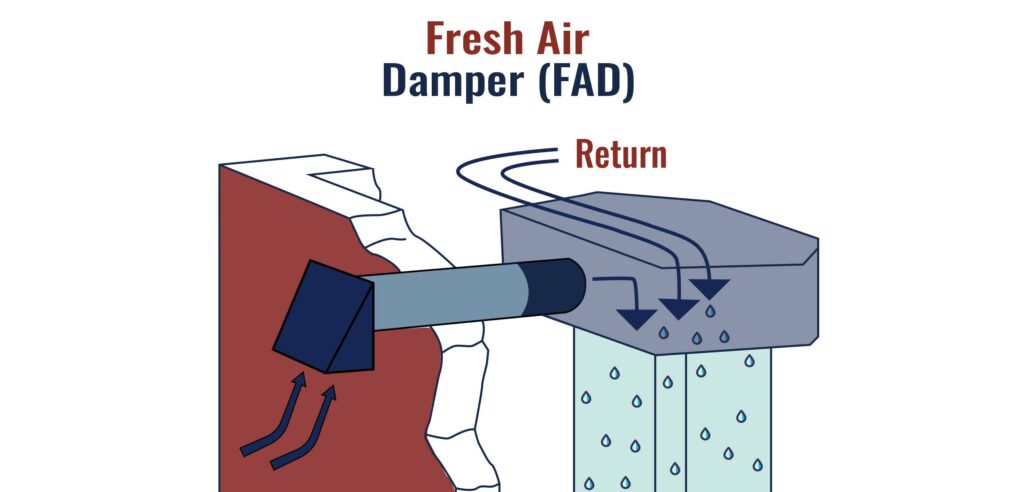
Close Fresh Air Intakes
Fresh air intake vents are a key part of your HVAC system and should remain open for your gas appliances to operate safely and properly. But when wildfires are stinking up the outside air, it’s okay to temporarily close these air intake ducts.
Most air intake vents will have a fresh air ventilation damper (FAD) that can be locked in the closed position. The damper acts as a sort of doorway for air to enter the vent.
Fresh air intake vents will be located nearby any gas appliances and furnaces. Follow the intake vent on an appliance to find the source of fresh air and the damper to close off airflow.
Fewer sources of unfiltered air entering your home means less wildfire smoke smells indoors.
Once The Smoke Clears
When the fires finally stop and winds brisk away the smokey air, you’re still left with lingering odours. But some post-wildfire cleanup will.
Getting the Smoke Smell Out of Your Clothes
A nice little trick to help get that smokey smell out of your clothing is to wash your clothes with some vinegar. Adding a cup of vinegar to your normal load of laundry with detergent can help eliminate the smell of smoke. In some cases, it may take a couple of loads to eliminate the stench completely.
Time for a Deep Cleaning
Every year, there finally comes a day when the smoke starts to clear up. The first thing you want to do is deep-clean the house to get that nasty smell out. While the smoke itself may be clearing, there are still loads of toxins in the fallen ash and particulate matter.
An N95 mask can filter almost 100% of particle matter which you’ll stir up while cleaning. Do yourself a favour and wear a mask for the big cleanup!
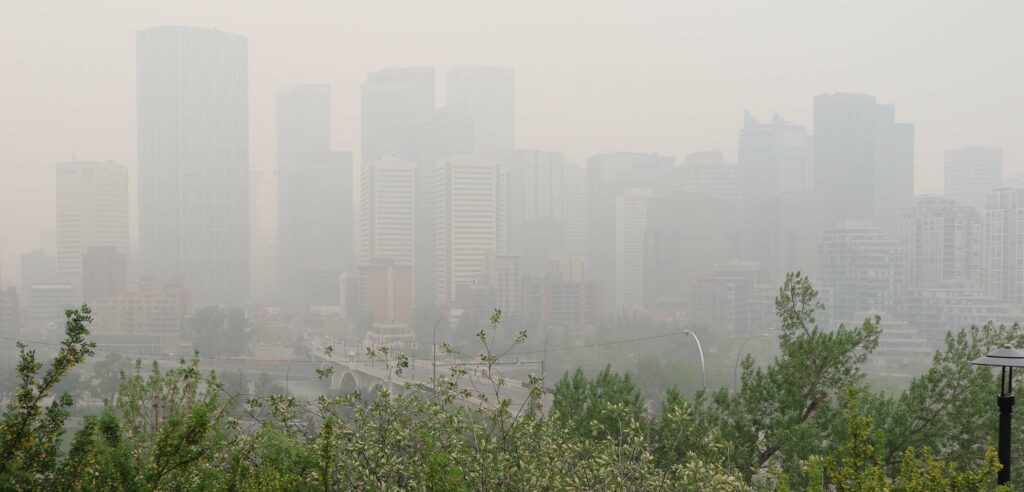
A Fresh Start for Your Ducts
Many pollutants remain in the environment following a wildfire and can continue to circulate through your home. Undoubtedly during the peak of wildfire season, at least some of these particles settled in your ducts.
A professional annual duct cleaning is always a good idea if you want to breathe healthy, clean air. But cleaning your ducts thoroughly after wildfire season is crucial for improving indoor air quality. Fresher air may now be coming into your home, but impurities coating your air ducts can contaminate this new, filtered air.
The bottom line is that it’s nearly impossible to completely seal off your house from wildfire smoke. But with a few of these measures, you can maintain decent air quality in your home and breathe a little easier.
For more HVAC solutions to prepare your home for the smokey season, contact Action Furnace for IAQ expertise in Alberta.
